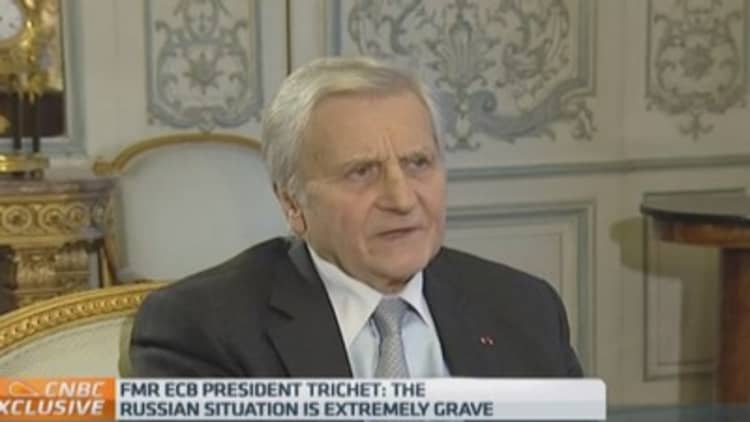
Russia's economic crisis is an "extremely grave" situation not only for the country itself, but for the rest of the European Union, the former president of the European Central Bank (ECB) told CNBC.
"(The situation in Russia) is certainly something which is extremely grave," Jean-Claude Trichet told CNBC. "Not only because we have geopolitical risks associated with what has happened in Ukraine and what is still happening. But also because what have now the price of oil which is going down very strongly."
The fallout from Russia's problems – which include the vertiginous fall of the ruble and MICEX stock index as a result of a declining oil price and sanctions from the West -- was not confined to the country, Trichet warned.
Read MoreRussia's cash already fled. Here's where it went
The Russian currency has declined around 50 percent against the dollar since sanctions were first placed on Russia for its intervention in Ukraine. The Russian central bank has made several interventions in an attempt to prop up the currency, making its most dramatic move yet this week when it hiked its key interest rate to 17 percent.
The "freefall" of the ruble reflected the "weaker position of Russia," Trichet said, adding that he wasn't sure that "the handling of the situation has been absolutely optimal from an operational standpoint" by the central bank -- a criticism echoed also by President Vladimir Putin in his annual press conference Thursday.
Read MorePutin speech sparks more ruble volatility
Trichet warned that it was very important for the European Union to try to find a solution to the Ukraine crisis and that it was threatened by the Russian economic crisis, given its close proximity and economic interdependence.
"It is one of the problems we have to cope with in the European Union (and) I hope very much that we will find out ways… as rapidly as possible to stabilize the situation. Both I would say from the geopolitical standpoint, from the sanctions standpoint…it seems to me very, very important."
Euro zone inflation "grave"
Russia was not the only threat to Europe's stability, Trichet said, with low inflation in the euro zone also very "grave" for the region.
"We have the possibility that the threat of inflation expectations medium- term being progressively un-anchored and at the level of the euro area that will be as a whole, grave," he added.
Against this backdrop, the European Central Bank (ECB) was right to consider using a full arsenal of weaponry to tackle low growth and even unconventional measures such as quantitative easing -- buying government debt.
"The ECB Governing Council -- reflecting on a permanent basis on what could be done to be more accommodating, and to avoid this situation (of deflation) -- seems to me perfectly legitimate. (But) which weaponry will be utilised is another story."
Trichet's comments come at a time of considerable debate within the central bank on how far to go to stimulate growth in the anemic euro zone.
Third-quarter gross domestic product grew by 0.2 percent on the previous quarter, data in November showed, but business activity slumped to a 16-month low in November, Markit data showed.
The slowdown in growth is no more evident in the slide in inflation in the 18-country region, at 0.3 percent in November and way below the ECB's target of an inflation rate below, but close to, 2 percent.
The ECB has launched several programs to try to reassure global markets and European countries that the euro zone is still open for business. From the latest proposals to purchase asset-backed securities and covered bonds to the "big bazooka" – the Outright Monetary Transactions (OMT) program announced in 2012 that would see the bank buy unlimited amounts of troubled euro zone countries' government bonds.
The latter program is hotly debated and disputed, however, with Germany in particular keen to avoid taking on the government debt of other euro zone nations. As such, the debate over whether the central bank will launch a U.S. Fed-style quantitative easing program is still up in the air.
Trichet said it was legitimate for the ECB to consider the possibility of buying government bonds, "provided it does not substitute what the governments have to do, what the parliaments have to do and what the private sector has to do."
- Written by CNBC's Holly Ellyatt, follow her on Twitter @HollyEllyatt. Follow us on Twitter: @CNBCWorld


